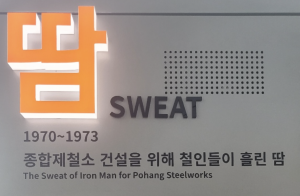Pohang: POSCO Museum
Photo essay of wall text of POSCO Museum of Pohang

Photo essay of wall text of POSCO Museum of Pohang

XXX


This essay will serve as the workspace for the Austin Anthropocene Campus Rhetoric Field Team.
"The role of epidemiology in disaster response policy development" cites this epi study. This article addresses the role of epidemiology in informing policies after a disaster to mitigate ongoing exposures, provide care and compensation, and improve preparedness for future disasters. It uses our article to support the argument that epidemiology should be used for prep for disaster.
The chapters' main idea is supported by the use of statistics, historical analysis, and personal anecdotes of immigrants going through the system.
- The literature quotes figures from the Seine-Saint-Denis department. They have collected data that corresponds to the different time periods of ideals and legislation on the immigration policy.
- This discusses the difference in ideals between the time periods over time. It discusses the change from approximately 1974 where the assumption that immigrants were only wanted if they were able to be an active producing member of the workforce to the 90s where compassion was more prevalent.
- The use of the testimonial of the Senegalese man shows the effort put into individuals to use their health as a reason for immigration. As stated by the article, the man had many arguments to try and apply for immigration status, but he heavily relied on his health to be the deciding factor.
Emily Goldmann, PhD, is a Reserach Professor at the NYU College of Global Public Health. She's an epidemioloigist and enjoys the study of the causes of mental health conditions. She's trying to spread the study of mental illness to a global scale. She studied at Columbia University and recieved her PhD from University of Michigan.
Sandro Galea, MD, DPH, is a Dean at Boston University. His work focuses on causes of brain disorders and sociological effects on urban population's health.
I can't really find any concise information in regards to the IIPNW having direct publications or legislation passed. They seem as more of an organization that compiles information, and presents at global colloquiums in order to swy opinions for preventions of escalation. They also have many outreach programs for new physicians that help support the idea of nuclear prevention.
Ian Ferris describes the methods and focus of the Rhetoric Field Team of the Austin Anthropocene Field Campus.